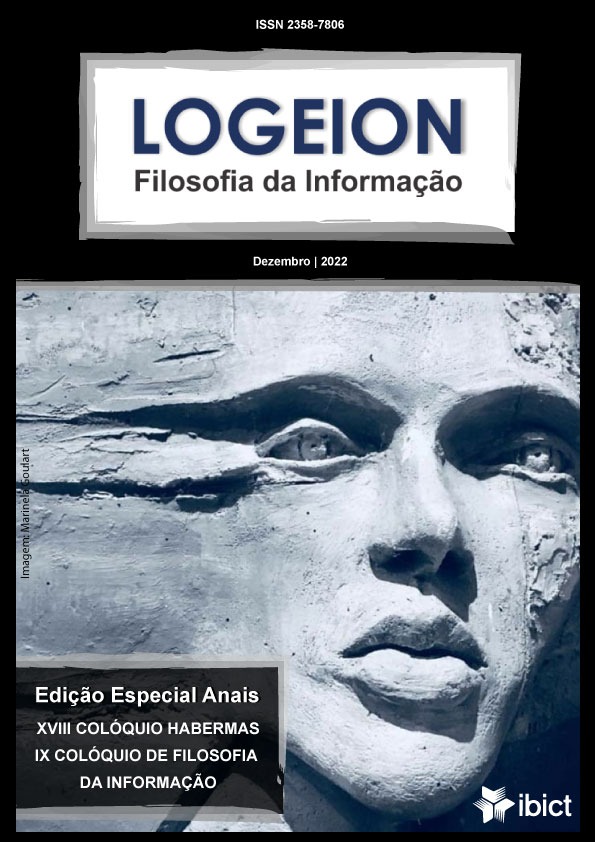Information in popper’s 'world 3'
epistemology of objective knowledge and information science
DOI:
https://doi.org/10.21728/logeion.2022v9nesp.p463-481Keywords:
Ciência da Informação. Popper. Conhecimento Objetivo. Evolução.Abstract
This study reflects on epistemological foundations of information science. It follows methods compatible with epistemological reflection, based on a bibliographic research of authors and themes relevant to the construction of the argument. It analyzes the works recovered through the critical interpretation of their theses. The hypothesis that mobilizes the discussion is that the objective theory of knowledge, from which karl popper's notion of 'world 3' results, has relevant consequences for an epistemological conception of information and, consequently, of information science. It presents an interpretation of 'world 3', in line with the foundations of information science, based on the examination of the evidence found in Popper's own works. Works by authors of information science who refer to Popper's theories are discussed in order to substantiate the interpretative line of the argument. It concludes by an identification between Popper's 'world 3' and the human culture. This results in the notion of an evolutionary process of information, in which information science plays a relevant role. In this image, information science would have the function of shaping the environment, replacing disordered information with information cultivated and created for human productive interests.
Downloads
References
BARROS, Roque Spencer Maciel. “Karl Popper: a busca inacabada”. In: PEREIRA, Juliano Cesar R. Popper, as aventuras da racionalidade. Porto alegre: EDIPUCRS. 1995.
BUCKLAND, Michael. “Information as Thing”. Journal of the American Society for Science (JASIS), v. 45, n. 5, p. 351-360. 1991.
CAPURRO, Rafael. “Epistemologia e Ciência da Informação”. V Encontro Nacional de Pesquisa em Ciência da Informação. 2003.
CAPURRO & HJORLAND. “O conceito de informação”. In: Perspectivas em ciência da Informação, vol. 12, n. 1, p. 148-207, jan/abr. 2007.
CARVALHO, Maria Cecília M. “Não sabemos: só podemos conjecturar”. In: PEREIRA, Juliano Cesar R. Popper, as aventuras da racionalidade. Porto alegre: EDIPUCRS. 1995.
DAWKINS. O gene egoísta. São Paulo: Companhia das Letras. 2007.
DENNETT, Daniel. A perigosa ideia de Darwin. São Paulo: Rocco. 1998.
DENNETT, Daniel. Brainstorms: ensaios filosóficos sobre a mente e a psicologia. São Paulo: Editora UNESP. 2006.
FLORIDI, Luciano. The Philosophy of Information. Oxford: Oxford University Press. 2010.
FLORIDI, Luciano. The Fourth Revolution: How Infosphere is Reshaping Human Reality. Oxford: Oxford University Press. 2014.
FUJITA, Mariangela; PINHEIRO, Lena Vânia Ribeiro. “Epistemology as a Philosophical Basis for Knowledge Organization”. In: GUIMARÃES; MILANI & DODEBEI (ed.). Knowledge Organization for a Sustainable World: Challenges and Perspectives for Cultural, Scientific and Technological Sharing in a Connected Society. Wurzburg: Ergon-Verlag. 2016.
GÓMEZ, Nélida Maria González. “Para uma reflexão epistemológica acerca da Ciência da Informação. Perspectivas em ciência da Informação, Belo Horizonte, v. 6, n. 1, p. 5-18, jan/jun. 2001.
MIRANDA, Antônio. “A ciência da informação e a teoria do conhecimento objetivo: Um relacionamento necessário”. In: AQUINO, Mirian de Albuquerque. O Campo da Ciência da Informação: gênese, conexões e especificidade. João Pessoa: Editora Universitária, UFPB. 2002, p. 9-24.
POPPER, Karl. Conhecimento Objetivo: uma abordagem evolucionária. (1972). Belo horizonte: Itatiaia; São Paulo: Editora da USP. 1975.
POPPER, Karl. O conhecimento e o problema corpo-mente. Lisboa: Edições 70. 2002.
ZINS, Chaim. “Knowledge organization: An epistemological perspective”. In: Knowledge Organization. September. 2002. Disponível em: https://www.researchgate.net/publication/ 288655770_Knowledge_organization_An_epistemological_perspective. Acesso em: 20 ago. 2018.
Downloads
Published
Issue
Section
License
Copyright (c) 2023 Logeion: Filosofia da Informação

This work is licensed under a Creative Commons Attribution-NonCommercial-ShareAlike 4.0 International License.
The journal is published under the Creative Commons - Attribution - Noncommercial - Share Alike 3.0 Brazil.
The published work is considered collaboration and therefore the author will not receive any remuneration for this as well as anything will be charged in exchange for publication.
All texts are responsibility of the authors.
It’s allowed partial or total reproduction of the texts of the magazine since the source is cited.














